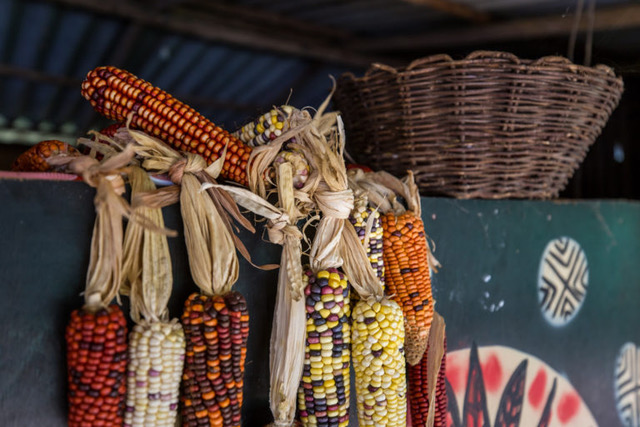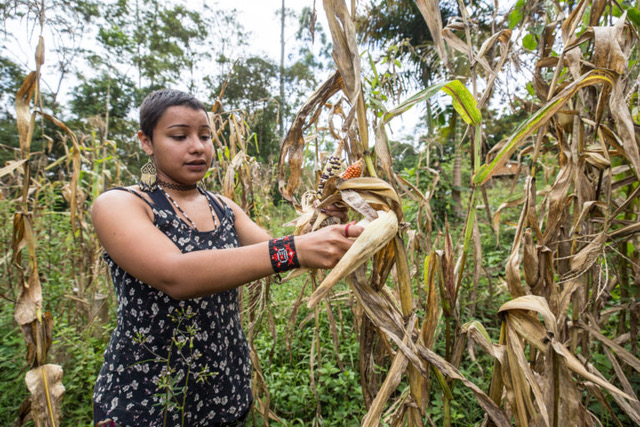
By: Raúl Zibechi
Those of us who have been trained in materialism and Eurocentric critical thought have serious difficulties in comprehending and accepting the role of spirituality in the emancipatory processes. We are deeply dependent on Marx’s famous phrase that referred to religion as “the opiate of the people,” and the reduction of the spiritual to hegemonic ecclesiastical institutions seems to comfort us. However, ignoring the spirituality of the peoples leads to reproducing capitalism through individualism and consumerism.
Thanks to the support of a small group of activists from Brazil, I was able to get to know the Tenondé Porá indigenous territory, inhabited by the Mbya Guarani in the forests of southern Sao Paulo municipality. In the last 10 years, they have developed intense struggles through the “retaking” of ancestral land, a process in which they recuperated almost 16,000 hectares and founded 12 new villages, where before there were just two.
The experience in the Kalipety community, the dialogues with community members, the exchanges with friends and especially having participated in the rituals in the “house of prayer,” showed me the limitations of the critical thought in which we were formed.1One of these limitations, linked to a narrow materialism, is the misunderstanding of spirituality as the mortar of the communities, of their link with the land and territory, and as the axis of their past and current resistances.
Spirituality that is neither religion nor ideology. It involves bodies and not just minds, recreates itself in everyday life and sustains human and non- human life. Monocultures don’t exist in the villages, nor the concentration of the means of production and everything that is consumed is produced by working, much of it through collective work.
==
Unlike the mystical or cultural events of social movements, which for short periods accompany mobilizations and formations, for the Mbya Guarani, spirituality extends in a “timeless time,” as Mario Benedetti wrote. The “house of prayer” is the symbolic center of community life. Every day, at sunset, the community dances and sings to the sound of their music, for a few hours. On certain occasions the “prayer” extends until dawn.
Spirituality is not practiced to obtain an end, to attain something that is asked of someone (gods, priests or politicians). We pray to be, to continue being who we are, individually and collectively, to remain different peoples. The video about Las Abejas of Acteal, (Weaving territory), abounds in this theme without mentioning it, because of the naturalness with which the Tsotsil people and the Mayas resist and reproduce their lives.
The spiritualities of the peoples, their world views and values are tightly linked to the struggle for autonomy. The reflection of Francisco López Bárcenas in “Autonomies and Indigenous Rights in Mexico” highlights forms of mobilization invisible to the outside, as those that “that they hold within themselves.” In these practices they turn to their spiritual guides with the aim of “restoring harmony between the men of this time and those of the past, as well as between society and its gods. “
In their sacred places they make offerings and commit to “mending their relationships with their ancestors, their deities and nature.” The reflection concludes by linking spirituality and autonomy: “Since many do not see them, or seeing them, do not understand them, they think that the peoples don’t mobilize, when in reality they are the most significant mobilizations for the peoples, because they construct their autonomy from them.”

==
Considering spirituality as a support for autonomy implies overcoming narrow materialism in order to adopt a broader perspective. In Western thought the key to community is collective land, understood as a means of production and not a comprehensive life space. From what I could sense, and from what is established where the peoples resist (once again I remember the four families in Nuevo San Gregorio), spirituality is a central aspect that complements and sustains the collective possession of land.
The resistances of the peoples are ordered around their own world views and spiritualities. They don’t seem preoccupied with ideologies or programs, as is the case with Eurocentric critical thought.
It still lacks comprehending spirituality as the core of an ethic of life that questions our ways of living, in particular individualism; an ethic that sustains those who resist capitalism, those who don’t sell out, don’t give up and don’t give in.
Photos: Felipe Abreu | Mongabay
Originally published by La Jornada, Friday, October 21, 2022, https://www.jornada.com.mx/2022/10/21/opinion/019a1pol English interpretation by the Chiapas Support Committee. Re-posted with permission by Schools for Chiapas.
